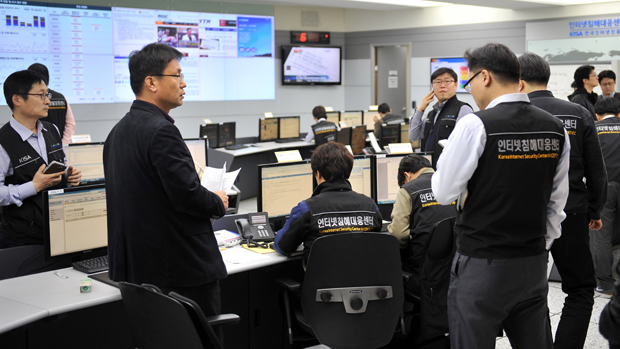N Korea is prime suspect as cyber-attack cripples South
Suspicion falls on Pyongyang as computer networks are hit at banks and TV stations

A free daily email with the biggest news stories of the day – and the best features from TheWeek.com
You are now subscribed
Your newsletter sign-up was successful
NORTH KOREA is suspected of launching an apparent "cyber-attack" on the South which paralysed computer systems at banks and television networks.
At least three major broadcasters and two banks in South Korea were hit in today's attack, which caused computer screens to go blank. There are also reports that skulls appeared on some monitors which "could indicate that hackers had installed malicious code in the networks", the BBC reports.
There is speculation that North Korea is responsible for the cyber-attack because "tensions are running high on the Korean peninsula" in the wake of the pariah state's third nuclear test last month. Five days ago, North Korea accused "the US and its allies" of launching cyber-attacks on its internet servers.
The Week
Escape your echo chamber. Get the facts behind the news, plus analysis from multiple perspectives.

Sign up for The Week's Free Newsletters
From our morning news briefing to a weekly Good News Newsletter, get the best of The Week delivered directly to your inbox.
From our morning news briefing to a weekly Good News Newsletter, get the best of The Week delivered directly to your inbox.
The BBC reports that the South Korean broadcasters KBS, MBC and YTN were affected by the incident as well as two banks, Shinhan Bank and Nonghyup. Their networks had been "partially or entirely crippled", the Korean Internet Security Agency (KISA) said.
South Korean authorities are "now trying to determine the cause of the network paralysis", a spokesman for the presidential office said. He added it was not yet known whether North Korea was involved.
North Korea is believed to have been responsible for two previous major cyber-attacks on the South, in 2009 and 2011, that targeted government agencies and finance companies. Seoul says it has identified 442 "sites and organisations" whose sole purpose is to attack South Korean computer systems via the internet, the Daily Telegraph says.
A recent KISA study said Pyongyang has been training a team of "dedicated hackers" since 1986 and is increasingly capable of launching coordinated attacks against "power utilities, traffic links, communications, the military and other state infrastructure".
A free daily email with the biggest news stories of the day – and the best features from TheWeek.com
The Telegraph says there is "particular concern" about South Korea's nuclear power stations – which supply 36 per cent of the country's electricity – and its high-speed rail network, which is controlled by a single command centre.
The paper points out that the attack coincides with meetings in Seoul between senior officials from South Korea and the US on ways to enforce the latest round of sanctions imposed on the North by the United Nations in the wake of last month's nuclear test.
-
 Quiz of The Week: 14 – 20 February
Quiz of The Week: 14 – 20 FebruaryQuiz Have you been paying attention to The Week’s news?
-
 The Week Unwrapped: Do the Freemasons have too much sway in the police force?
The Week Unwrapped: Do the Freemasons have too much sway in the police force?Podcast Plus, what does the growing popularity of prediction markets mean for the future? And why are UK film and TV workers struggling?
-
 Properties of the week: pretty thatched cottages
Properties of the week: pretty thatched cottagesThe Week Recommends Featuring homes in West Sussex, Dorset and Suffolk
-
 Ex-South Korean leader gets life sentence for insurrection
Ex-South Korean leader gets life sentence for insurrectionSpeed Read South Korean President Yoon Suk Yeol was sentenced to life in prison over his declaration of martial law in 2024
-
 Epstein files topple law CEO, roil UK government
Epstein files topple law CEO, roil UK governmentSpeed Read Peter Mandelson, Britain’s former ambassador to the US, is caught up in the scandal
-
 Iran and US prepare to meet after skirmishes
Iran and US prepare to meet after skirmishesSpeed Read The incident comes amid heightened tensions in the Middle East
-
 Israel retrieves final hostage’s body from Gaza
Israel retrieves final hostage’s body from GazaSpeed Read The 24-year-old police officer was killed during the initial Hamas attack
-
 China’s Xi targets top general in growing purge
China’s Xi targets top general in growing purgeSpeed Read Zhang Youxia is being investigated over ‘grave violations’ of the law
-
 Panama and Canada are negotiating over a crucial copper mine
Panama and Canada are negotiating over a crucial copper mineIn the Spotlight Panama is set to make a final decision on the mine this summer
-
 Why Greenland’s natural resources are nearly impossible to mine
Why Greenland’s natural resources are nearly impossible to mineThe Explainer The country’s natural landscape makes the task extremely difficult
-
 Iran cuts internet as protests escalate
Iran cuts internet as protests escalateSpeed Reada Government buildings across the country have been set on fire